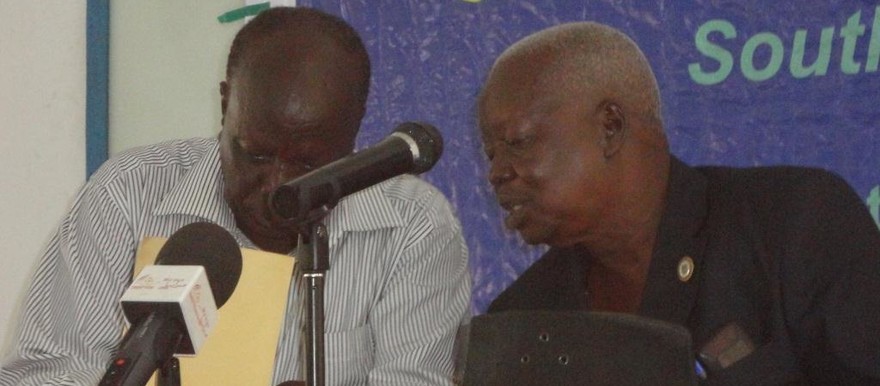The former chief Justice of South Sudan denied there was a ‘mess’ in the justice system, when asked about the state of the judiciary at a lecture at Juba University.
Justice Ambrose Riiny Thiik participated in a public lecture at the college law on Saturday for the purpose of raising legal awareness among the citizens of South Sudan.
Thiik, who took the post of chief justice in 2005, and UNMISS justice advisor John Ugolo, spoke on the theme ‘the genesis of the judiciary in South Sudan: the formative years.’
Justice Thiik attempted to narrate the genesis of law in the then Southern Sudan and started saying that the SPLM/SPLA leadership made the first laws at a meeting in Chukudum in 1994.
According to Justice Thiik, these laws were made in line with the vision of ‘The New Sudan,’ and was then applied by judges not only from South Sudan but also from South Kordofan, Blue Nile and other parts of Sudan.
Another convention was also held in 2001 and necessary changes were made in the laws of Southern Sudan. As to whether there was law in the bush during the long civil war between the ex-rebels and the government of Sudan, Justice thiik said: “In the bush we had general court-martial, district court-martial and payam court-martial laws.”
According to Justice Thiik, these courts were set up to solve problems of the time and have been improved with the time. During a period for questions after the lecture, one of the students of law asked the justice, “Can you explain the mess that has been going on in the judiciary system?”
He replied in answering the question, “Who told you there was a mess in the judiciary system?” denying there was a mess in the judiciary during his time.
He then warned the student to mind his language when asking questions.
Another man asked, “What are the advantages and disadvantages of centralized and decentralized judiciary system?” and the judge replied, “I like the question, I preferred a centralized judiciary even though we have a decentralized system”.
Among those who attended were Hon. Ajoye Perpetna Paya, deputy head of legal administration in the office of the president, UNMISS chief justice advisor John Ugolo, Hon. Michael Makuei Lueth, government officials, NGO officials, journalists, students of the University of Juba and concerned citizens from outside.
The program is reported to have been funded by UNMIS and broadcast on the UN radio network.




